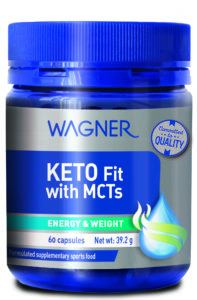
Keto Fit with MCT’s contains a combination of Coconut MCT’s, Apple Cider Vinegar, L-Cartinine to support a ketogenic lifestyle and support your exercise routine. Keto with MCTs is supplied in easy to take capsule format.
Adults: Take 1 hard capsule with water, once daily.
Precautions and contra-indications:
WARNING: Formulated supplementary sports food. Not suitable for children under 15 years of age or pregnant women. Should only be used under medical or dietetic supervision. Not a sole source of nutrition and should be consumed in conjunction with a nutritious diet and an appropriate physical training or exercise program. Always read the label. Do not exceed daily dose.
Contains: Sulfites.
Formulated without:
Gluten, wheat, yeast, dairy products, egg, artificial flavours, artificial sweeteners.
Each capsule contains:
MCT oil powder (31%), LevoCarnitine Tartrate, Gelatin,
Microcrystalline cellulose, Gum Arabic, Magnesium
stearate, Silica, Nicotinamide, Apple cider vinegar
powder, Calcium Pantothenate, Pyridoxine HCL,
Riboflavin, Thiamine hydrochloride, Silicon dioxide,
Cyanocobalamin.
Frequently asked questions:
Q1 What are MCTs?
A1 MCT stands for Medium Chain Triglycerides, a type of
fat.1 MCTs are shorter in length and easier to digest than
the Long-Chain Triglycerides (LCTs) found in fats and oils
such as fish oil.
Q2 What are the health benefits of MCTs?
A2 Medium Chain Triglycerides can help speed up the
metabolism and increase energy production.2-4 They
may help the body burn calories faster than LCTs by
helping the body stay in a fat-burning state known
as ‘ketosis’.5-7 Research also suggests that they may
encourage the body to burn abdominal fat or ‘belly fat’.8
Q3 What is carnitine and what does it do?
A3 Carnitine is an amino acid that plays an important role
in transporting fats into the cells, where they can be burned
for energy production.9-11 It is also believed that carnitine
may assist in weight management.12
Q4 Why are there B vitamins in this formula?
A4 The main function of the B vitamins is to help with energy
production. B-vitamins play a role in converting
carbohydrates, proteins, and fats into energy. Thiamine (B1),
riboflavin (B2), niacin (B3) and pantothenic acid (B5) help
extract energy from carbohydrates, fats, and protein. Niacin
(B3) also breaks down carbohydrates and fats, while
pyridoxine (B6) and cobalamin (B12) assist the production
of red blood cells which are necessary for the transport
of oxygen to all cells in the body.13-18 Low levels of any of
these vitamins can disrupt the metabolism and cause the
body to store the energy in carbohydrates, fats and protein
as fatty tissue.
Research shows that if a high-fat diet is supplemented
by B-vitamins, this results in an increased metabolism
and a reduction in body weight.19
